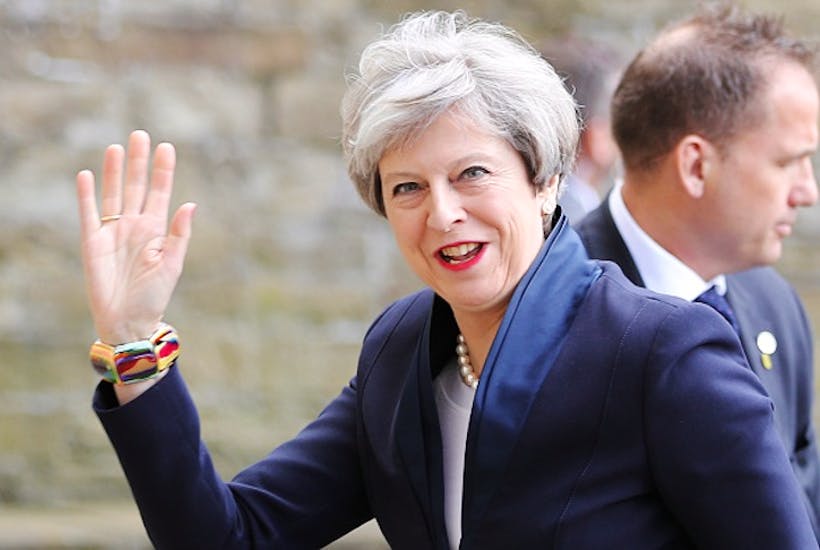Where’s all the unpredictability in politics gone? After the hubbub about a ‘crisis of liberalism’ and the thrills of punting on Trump and Brexit, election betting in 2017 is beginning to look almost boring. Everybody who wasn’t crazy — or excessively paranoid about the return of fascism — knew that Emmanuel Macron would beat Marine le Pen in the second round of the French presidential election. He did. That funny-looking anti-Islamist Geert Wilders did not triumph in Holland. And now it looks as if Angela Merkel will win re-election in Germany in September.
Closer to home, Theresa May looks all but certain to win a majority on 8 June — unless our polling companies have somehow become even more useless since 2015.
The fun, then, comes not from wagering on spectacular upsets, but in looking at the nitty-gritty. Most bookmakers now offer odds on details such as: what will the size of May’s majority be? At the moment, thanks in no small part to those remarkable local election results on 4 May, everybody expects a Tory landslide. As I write, the odds on a Conservative majority of 150 to 174 seats are about 9/2 on Betfair exchange.
That can hardly be described as generous, given that such a handsome haul would represent the Conservative party’s greatest post-war victory. The price on an even bigger Tory majority of 175-199 seats is 15/2, and a 200-224 triumph is between 14/1 and 15/1.
If you think Theresa will crush everything before her, then you might want to ‘lump on’, as we punters say. But the shrewder bet would be against the market. Local elections are notoriously unreliable predictors of general elections, and however towering May’s advantage in the polls may look now, history suggests the market will correct itself. Jeremy Corbyn may be the worst possible Labour leader, utterly toxic to Middle England, but his campaign seems to be finding rhythm as election day draws closer. Corbyn is drawing sizeable crowds to his stump speeches — unlike Mrs May — and the Labour manifesto has gone down quite well, largely because it was not shadow chancellor John McDonnell’s translation of his favourite read, Chairman Mao’s little red book.
An Opinium survey conducted this month found Labour on course to win a higher voter share than Ed Miliband did in 2015. May will hoover up a lot of Ukip votes, thanks to her seemingly eager pursuit of Brexit, but quite a few of those disgruntled Old Labour voters will rally to Corbyn, no matter how much council housing and energy-price-capping the Prime Minister offers.
I’m not about to suggest that Labour can win a majority — though at 65/1 the idea appeals to my irrationally contrarian instincts. But I will say that the value in the betting markets is on a smaller Tory win: a 75-99 majority is at 10/1, while 50-74 is a more alluring 18/1.
The safer approach is to spread your bets, of course. So, for instance, on Betfair you can back any Conservative majority from 50 to 224 and come out with a profit. I’ve weighted my bets so I win more on a smaller May triumph and less and less as her majority grows. You can adjust the spread whichever way you want. The danger is that the Tories fall short — I can’t see them over-shooting 224 — but that’s a risk worth taking, I’d say. You can then take your winnings and lose it all on Jordan Spieth to win the Open at 14/1.
Alternatively, it might be worth betting on the Green party to win more than two seats. The odds (13/8 with Skybet) aren’t great, but the Greens are doing well in the polls. They seem to be enjoying the left-liberal surge that the Lib Dems hoped might be theirs. Jeremy Corbyn is not about to stand down his candidates to help out the Greens, as advocates of the ‘progressive alliance’ hoped. But Caroline Lucas should hold Brighton Pavilion, and they only need a small swing to win in Bristol West, Bristol South or Norwich South. The Greens’ biggest disadvantage now is that disillusioned trendy journalists are turning to them as their last hope in this ‘dark age of populism’. Nothing puts off actual voters quite like the Guardianistas.
One final recommendation, though sadly too late for 2017: bet on whomever Fraser Nelson, editor of The Spectator, says will win the Eurovision Song Contest. Fraser really knows his stuff, and listeners to our excellent Coffee House Shots may have heard him say Portugal (9/2) would be victorious this year. He was right. I’d recommend subscribing to the podcast and listening out for his 2018 Eurovision pick. Frankly, you’d be better off following his tips for the general election, too.







Comments